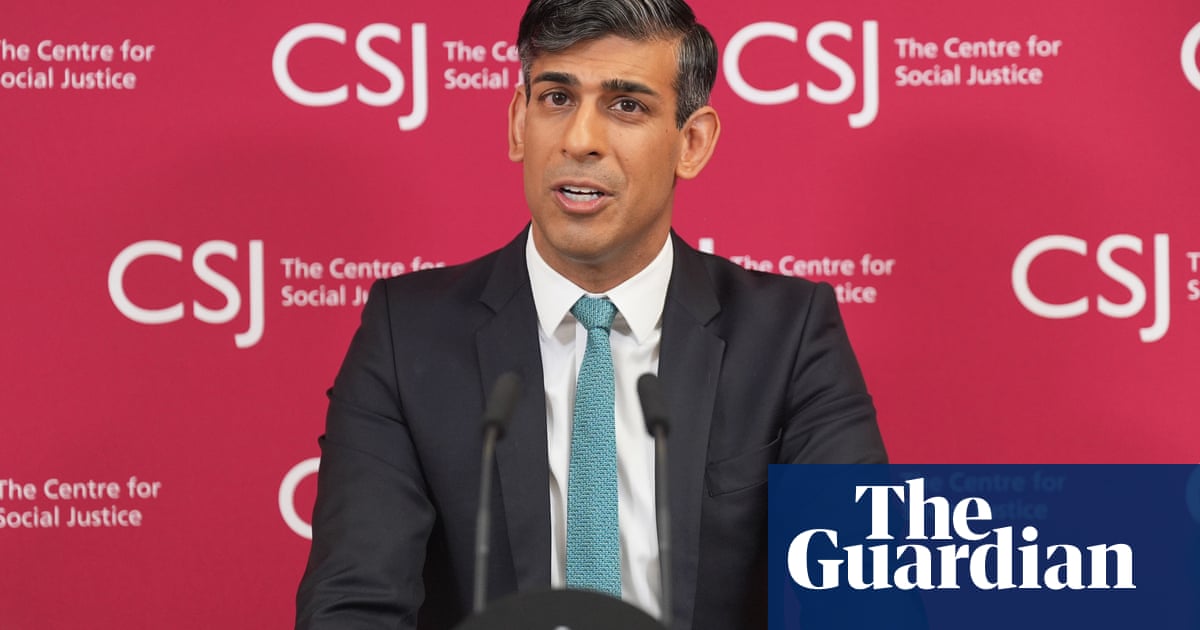
Rishi Sunak has been accused of making mental ill health “another front in the culture wars”, as critics warned his plan to curb benefits for some with anxiety and depression was an assault on disabled people.
In a speech on welfare, the prime minister said he wanted to explore withdrawing a major cash benefit claimed by people living with mental health problems and replacing it with treatment.
However, charities said treatment was not available now for many, with 1.9 million on the NHS waiting list for mental health services and some experiencing worsening conditions while they remain without help.
Scope, the disability equality charity, said the proposals were “dangerous and risk leaving disabled people destitute”, as well as making people’s ill – health worse by increasing their anxiety. James Taylor, the charity’s director of strategy, said the speech “feels like a full-on assault on disabled people”.
Launching a review of the personal independence payment (Pip), a non-means-tested benefit helping disabled people with the extra costs of their health problems, Sunak said Britain was suffering from a “sicknote culture”.
He added the review would consider asking for more medical evidence before awarding the benefit, look at whether some payments should be one-off rather than ongoing, and examine whether to stop cash payments for some mental health conditions.
The prime minister said it would seek to be “more precise about the type and severity of mental health conditions that should be eligible for Pip”, and that it was “not clear they have the same degree of increased living costs as those with physical conditions”.
Sunak added: “When you look at the numbers, half of people becoming inactive over the last year citing depression and anxiety, tripling in the number of people that have been signed off as sick in the last decade, that doesn’t quite strike us as right.”
The announcement led to an outcry from disability charities, which said the rates of people being signed off work and claiming benefits were caused by crumbling public services, poor quality jobs and high rates of poverty among disabled households.
Charities also raised the alarm about Sunak’s rhetoric on mental ill health, after the prime minister said there was a “risk of over-medicalising what are essentially the everyday worries and challenges of life” in the welfare system.
Dr Sarah Hughes, the chief executive of the mental health charity Mind, said rhetoric that conjures up the image of a “mental health culture that has gone too far … is harmful, inaccurate and contrary to the reality for people up and down the country”.
“The truth is that mental health services are at breaking point following years of underinvestment, with many people getting increasingly unwell while they wait to receive support,” she said.
Labour said people were already crying out for NHS mental health support, and there was an “unprecedented crisis in mental health care”.
Wes Streeting, the shadow health secretary, said: “For the Conservatives to be attempting to make mental ill health another front for their culture wars is not just tone deaf, it’s shameless and irresponsible. Instead of attempting to cover up the scale of the problem, the next Labour government will give people the support they desperately need.”
Sunak set out his proposed changes to disability benefits at the Centre for Social Justice thinktank in London. He said “something has gone wrong” since the pandemic to increase the number of economically inactive people who are long-term sick, especially with mental health conditions.
“Most worrying, the biggest proportion of long-term sickness came from young people … parked on welfare,” Sunak said.
He said the country could not afford the “spiralling” disability welfare bill of £69bn, which was now more than the core schools budget, and claimed the Pip budget was forecast to increase by 50% in the next four years.
Other measures he set out included:
Shifting responsibility for issuing fit notes, formerly known as sicknotes, away from GPs to other “work and health professionals” in order to encourage more people to return to work.
Confirming plans to legislate “in the next parliament” to close benefit claims for anyone who has been claiming for 12 months but is not complying with conditions on accepting available work.
Asking more people on universal credit working part-time to look for more work by increasing the earnings threshold from £743 a month to £892 a month, so people paid below this amount have to seek extra hours.
Confirming plans to tighten the work capability assessment to require more people with “less severe conditions” to seek some form of employment.
Mel Stride, the work and pensions secretary, told Sky News on Friday: “If you go to the GP and say you are feeling a little bit depressed, and you’re signed off, in 94% of occasions, a box is ticked that says you’re not capable of work whatsoever.
“What we want to do is change the system so that that individual will be referred to – the government is setting up something called Work Well – where they will get both the healthcare support they need, but also a work coach who will be involved to either help them stay in work if they are in employment, or to help them get into work if they’re not.”
Trade unions for doctors and nurses expressed concerns about Sunak’s suggestion that there was a risk of “over-medicalising” mental health conditions, although he insisted that clinical decisions about diagnoses were always a matter for professionals.
The British Medical Association said the prime minister should focus on getting people access to the medical help they needed to get back to work rather than “pushing a hostile rhetoric on ‘sicknote culture’”.
Prof Pat Cullen, the general secretary of the Royal College of Nursing, said: “Nursing staff are the largest single workforce in health and care, but they themselves are suffering from increasingly poor long-term health.
“The prime minister’s overtures about ‘sicknote culture’ will be deeply offensive to a profession hit hard by long Covid and a spiralling mental health crisis. Issues of population health are not ones that a government can simply instruct away.”
The Institute for Fiscal Studies said the current and next government would have to find a way of either funding the rising bill for disability benefits or cutting them but that it was still unclear what was behind the increase in claims.
Sam Ray-Chaudhuri, an economist at the IFS, said: “A year or so ago, it seemed plausible that the rapid rise in numbers claiming health-related benefits was a transitory pandemic-related phenomenon. That explanation now appears unlikely, and today’s new forecasts reflect this fact.
“The rising cost of these benefits, and what might be done in response, will be a pressing concern for the next government and make the already tough fiscal situation harder still. Unfortunately, designing the right policy response is made much more difficult by the lack of clarity on what is fuelling the rise.”











